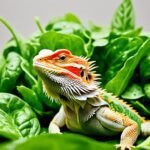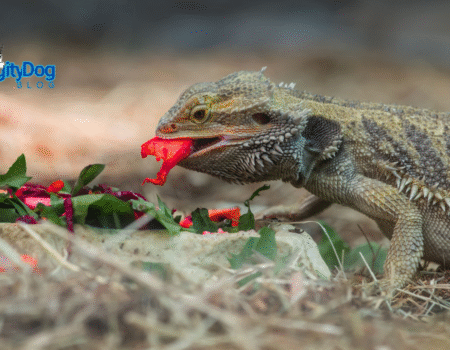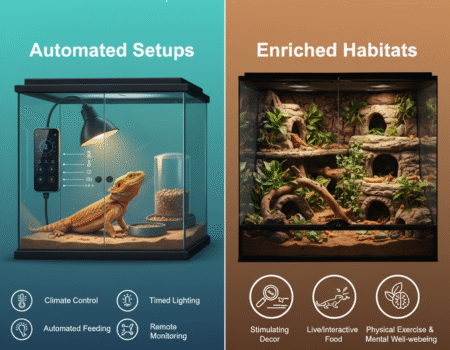“The greatness of a nation and its moral progress can be judged by the way its animals are treated.” – Mahatma Gandhi
Welcome to today’s article on whether bearded dragons can eat tomatoes! As responsible pet owners, it’s crucial to provide our scaly friends with a nutritious and well-balanced diet. And when it comes to introducing new foods like tomatoes into their meals, it’s essential to know the facts to ensure their health and well-being.
Bearded dragons are omnivorous reptiles, meaning they can consume a variety of fruits, vegetables, and insects. While tomatoes are generally safe for them to eat, there are some important considerations to keep in mind to ensure their safety and overall health.
Why Can’t Bearded Dragons Eat Tomatoes Every Day?
Bearded dragons love the occasional juicy treat, but when it comes to tomatoes, moderation is key. While tomatoes may seem harmless, feeding them to your bearded dragon every day can lead to a variety of health issues.
Firstly, tomatoes are highly acidic and can cause digestive issues and dehydration in bearded dragons. Their delicate digestive systems are not equipped to handle the acidity of tomatoes on a daily basis, and this can result in discomfort and an imbalance in their gut.
Secondly, tomatoes are rich in beta carotene, which is a precursor to Vitamin A. While Vitamin A is important for a bearded dragon’s health, excessive consumption of beta carotene can lead to Vitamin A toxicity. This condition can cause a range of symptoms, including loss of appetite, muscle weakness, and even organ damage.
Thirdly, tomatoes are not a nutritionally balanced food for bearded dragons. They are low in calcium and high in phosphorus, which can disrupt the delicate calcium-phosphorus balance needed for healthy bone development. Prolonged imbalance can lead to metabolic bone disease, a condition characterized by weakened bones and deformities.
In summary, feeding bearded dragons tomatoes every day can result in digestive issues, dehydration, Vitamin A toxicity, and poor nutrition. It is essential to offer a varied and balanced diet to ensure their optimal health and well-being.
How Often Can Bearded Dragons Have Tomatoes?
Bearded dragons can enjoy the occasional tomato treat, but it’s crucial to limit their consumption to once a month. While tomatoes offer some health benefits, such as being low in sugar and high in Vitamin A, it’s essential to avoid feeding them too frequently to prevent any potential negative effects.
Tomatoes contain lycopene, an antioxidant that promotes overall health and helps prevent cancer in bearded dragons. Additionally, their low sugar content makes them a suitable choice for occasional tomato consumption. However, it’s important to keep in mind that tomatoes are also acidic and can cause digestive issues if given in excess.
Here’s a summary of the key points about how often bearded dragons can have tomatoes:
- Tomatoes can be given to bearded dragons once a month.
- Occasional tomato consumption provides health benefits:
- Low in sugar
- High in Vitamin A
- Contains lycopene, an antioxidant
By balancing tomato consumption with a variety of other foods, you can ensure that your bearded dragon receives a nutritious and well-rounded diet.
Keep in mind that the occasional tomato treat should be part of a broader dietary plan and not the main source of nutrition for your bearded dragon. Monitoring their overall calcium-phosphorus balance and providing a variety of other vegetables and fruits will help maintain their optimal health.
How Can Bearded Dragons Eat Tomatoes?
When it comes to serving tomatoes to bearded dragons, it’s important to take certain precautions to ensure their safety and well-being. While tomatoes can be enjoyed by these reptiles, it’s crucial to follow the proper guidelines to minimize any potential risks.
1. Selecting the Right Serving Size
To serve tomatoes to your bearded dragon, opt for a quarter of a tomato or two grape tomatoes. This portion size is small enough to prevent any digestive issues or dehydration that may arise from tomato consumption.
2. Preparing the Tomatoes
Before feeding tomatoes to your bearded dragon, make sure to properly wash and peel the tomato. This helps remove any potential pesticides or dirt that may be present. Additionally, removing the seeds is essential as they can pose a choking hazard to your pet. Cut the tomato flesh into small, bite-sized pieces to ease consumption.
3. Raw is the Way
Unlike some other vegetables, tomatoes can be served raw to bearded dragons. There’s no need to cook them, as they can be easily digestible in their raw form. This simplifies the serving process and allows you to provide a fresh and nutritious treat.
By following these simple steps, you can safely incorporate tomatoes into your bearded dragon’s diet. Remember, moderation is key, and it’s always best to consult with a reptile veterinarian regarding your pet’s specific dietary needs.
Can Bearded Dragons Eat Tomato Leaves and Stems?
When it comes to feeding bearded dragons, it’s essential to provide them with safe and nutritious food. While bearded dragons can consume the flesh of tomatoes in moderation, it’s important to note that the leaves and stems of tomato plants are not suitable for them to eat. Tomato leaves and stems belong to the nightshade family and contain alkaloids, which are toxic to reptiles like bearded dragons.
To ensure the health and well-being of your bearded dragon, it is crucial to only offer them the edible parts of the tomato, which include the fleshy fruit itself. Avoid giving them any other parts, including leaves, stems, or even tomato seeds. By doing so, you can prevent any potential risk or harm that may arise from the alkaloids present in these toxic plant parts.
Remember, providing a safe and balanced diet is essential for the overall health and longevity of your bearded dragon. While tomatoes can offer some benefits in moderation, it’s crucial to be aware of their limitations and potential risks.
What Can Bearded Dragons Eat More Often Than Tomatoes?
While tomatoes can be given as an occasional treat, there are other vegetables and fruits that can be included more frequently in a bearded dragon’s diet. These alternatives provide a better balance of nutrients and are safer for regular consumption compared to tomatoes.
Alternative Vegetables:
1. Acorn squash
2. Bell peppers
3. Broccoli
4. Green beans
5. Sweet potato
6. Yellow squash
These vegetables are rich in vitamins and minerals, providing essential nutrients for your bearded dragon’s health and well-being.
Alternative Fruits:
1. Apples
2. Mango
These fruits can be given in small quantities as occasional treats, offering natural sweetness and added variety to your bearded dragon’s diet.
Remember to wash all vegetables and fruits thoroughly before feeding them to your bearded dragon. Remove any seeds, pits, or core to prevent choking or digestion issues. It’s important to offer a variety of foods to ensure a well-rounded diet and meet the nutritional needs of your reptile friend.
“A diverse diet is key to ensuring the overall health and nutritional balance of your bearded dragon.” – Dr. Samantha Johnson, Reptile Nutritionist
Can Bearded Dragons Eat Cherry Tomatoes?
Bearded dragons can indeed eat cherry tomatoes as they provide similar nutritional benefits to larger tomatoes. However, there are a few considerations to keep in mind when feeding cherry tomatoes to your bearded dragon.
One challenge with cherry tomatoes is their small size, which makes it difficult to remove all of the seeds. It is crucial to eliminate the seeds to prevent potential choking or compaction risks for your reptile friend. To do this, it is recommended to cut the cherry tomatoes into quarters and gently scoop out the seeds before feeding them to your bearded dragon.
An advantage of cherry tomatoes is that their skins are softer compared to larger tomatoes. This means that you can feed them to your bearded dragon without peeling them, saving you time and effort while still providing a variety in their diet.
When incorporating cherry tomatoes into your bearded dragon’s meal plan, it’s essential to remember that they should be offered in moderation. As an occasional treat, cherry tomatoes can contribute to a balanced diet for your pet.
| Nutrient | Amount in Cherry Tomatoes |
|---|---|
| Vitamin A | Approximately 15% of the recommended daily intake (RDI) per 100g (3.5oz) |
| Vitamin C | Approximately 13% of the RDI per 100g (3.5oz) |
| Calcium | Approximately 2% of the RDI per 100g (3.5oz) |
| Phosphorus | Approximately 3% of the RDI per 100g (3.5oz) |
While cherry tomatoes offer some nutritional value, it’s important to note that they should not be the sole source of nutrients for your bearded dragon. In addition to cherry tomatoes, be sure to provide a well-rounded diet with a variety of vegetables, fruits, and appropriate proteins to meet your bearded dragon’s dietary needs.
Can Baby Bearded Dragons Eat Tomatoes?
Baby bearded dragons can eat tomatoes, but in smaller quantities compared to adult bearded dragons. It is important to note that their delicate digestive systems and growing bodies require specific dietary considerations. While tomatoes can provide some nutritional benefits, they should be given sparingly to baby bearded dragons to avoid potential digestive issues and nutrient imbalances.
As baby bearded dragons have smaller stomachs and a higher risk of dehydration, it is recommended to offer them one small piece of tomato, approximately the size of an M&M, every two weeks. This small serving size allows them to enjoy the flavors and nutrients of tomatoes without overwhelming their system. As they grow and their digestive systems develop, the amount of tomato can be gradually increased.
It is important to monitor the reaction of baby bearded dragons to tomato consumption. If any digestive issues or adverse reactions occur, it is advisable to discontinue feeding tomatoes and consult a reptile veterinarian for further guidance.
Feeding baby bearded dragons a well-balanced diet that includes other vegetables, fruits, and protein sources is crucial for their growth and overall health. Variety is key to providing them with the necessary nutrients they need to thrive. It is recommended to consult a reptile veterinarian or a herpetologist for expert advice on creating a proper diet plan for baby bearded dragons.
Nutritional Value of Tomatoes
Tomatoes are not only delicious but also packed with essential vitamins and minerals that can benefit bearded dragons. They contain a variety of nutrients, including:
- Vitamin A: Tomatoes are rich in Vitamin A, which is vital for maintaining healthy skin, vision, and a strong immune system.
- Vitamin C: These juicy red fruits also provide a good amount of Vitamin C, an antioxidant that promotes tissue repair and boosts the immune system.
- Calcium: While tomatoes do contain some calcium, the amount is relatively low compared to other fruits and vegetables. However, calcium is crucial for bearded dragons’ bone health, so it’s essential to ensure they receive sufficient amounts from other sources.
- Iron: Tomatoes have a small amount of iron, which is important for carrying oxygen throughout the body and preventing anemia.
- Potassium: This mineral helps regulate fluid balance, maintain healthy muscles, and support proper heart function.
- Magnesium: Tomatoes also contribute to a bearded dragon’s magnesium intake, which is necessary for enzyme function and muscle health.
Additionally, tomatoes are low in sugar, which can be beneficial for bearded dragons, as they do not require a high-sugar diet. They also contain lycopene, an antioxidant that gives them their vibrant red color and has been linked to various health benefits, including reducing the risk of certain diseases.
However, it’s important to note that tomatoes have a lower calcium content compared to phosphorus. This ratio can disrupt the calcium-phosphorus balance in a bearded dragon’s diet, potentially leading to metabolic bone disease. Therefore, while tomatoes can be included as part of a varied diet, they should not be the primary source of nutrition for bearded dragons.
Overall, tomatoes can be a healthy addition to a bearded dragon’s diet when fed in moderation. They offer vitamins, minerals, and antioxidants that support overall health. However, it is essential to ensure a balanced diet with appropriate calcium-phosphorus ratios to prevent any potential health issues.
Benefits and Disadvantages of Feeding Bearded Dragons Tomatoes
Feeding bearded dragons tomatoes can offer several benefits for their overall health and well-being. Tomatoes are a good source of Vitamin A, which plays a crucial role in maintaining their immune system and promoting healthy eyesight. Additionally, tomatoes have a low sugar content, which is important to prevent obesity and other related health issues in bearded dragons. Furthermore, tomatoes contain antioxidants such as lycopene, which can help reduce the risk of certain diseases.
However, it is essential to be aware of the disadvantages of feeding bearded dragons tomatoes. Tomatoes have a high water content, which can lead to excessive hydration and potentially cause digestive problems in these reptiles. They also contain citric acid, which can be harsh on their digestive system and cause discomfort. Furthermore, tomatoes have a low calcium content and a high phosphorus content, which can disrupt the calcium-phosphorus balance and result in metabolic bone disease if consumed in excess.
Therefore, it is crucial to feed tomatoes to bearded dragons in moderation and as part of a balanced diet. Providing a variety of other vegetables, fruits, and insects will help ensure that they receive all the necessary nutrients without overloading on tomatoes. Remember to consult with a reptile veterinarian or a specialist to determine the appropriate amount and frequency of tomato consumption for your bearded dragon, taking into consideration their age, size, and overall health.
FAQ
Can bearded dragons eat tomatoes?
Yes, bearded dragons can safely eat tomatoes, but only in small amounts and not more than once a month.
Why can’t bearded dragons eat tomatoes every day?
Bearded dragons cannot eat tomatoes every day because they can cause digestive issues and dehydration due to their acidity. They also have a low calcium content and a high phosphorus content, which can lead to metabolic bone disease if consumed in excess.
How often can bearded dragons have tomatoes?
Bearded dragons can have tomatoes occasionally, about once a month. Despite the potential risks, tomatoes offer some health benefits for bearded dragons.
How can bearded dragons eat tomatoes?
Bearded dragons can be served a quarter of a tomato or two grape tomatoes once a month. It is important to thoroughly wash and peel the tomato, remove the seeds, and cut the flesh into small pieces. Tomatoes can be served raw, so there is no need to cook them.
Can bearded dragons eat tomato leaves and stems?
No, bearded dragons should not eat tomato leaves and stems as they are part of the nightshade family and contain alkaloids, which are toxic to reptiles.
What can bearded dragons eat more often than tomatoes?
While tomatoes can be given as an occasional treat, there are other vegetables and fruits that can be included more frequently in a bearded dragon’s diet.
Can bearded dragons eat cherry tomatoes?
Yes, bearded dragons can eat cherry tomatoes as they have a similar nutritional value to larger tomatoes. However, it is recommended to cut them into quarters and remove the seeds to prevent choking or compaction risks.
Can baby bearded dragons eat tomatoes?
Yes, baby bearded dragons can eat tomatoes, but in even smaller quantities compared to adult bearded dragons.
What is the nutritional value of tomatoes?
Tomatoes contain various vitamins and minerals, including Vitamin A, Vitamin C, calcium, iron, potassium, and magnesium.
What are the benefits and disadvantages of feeding bearded dragons tomatoes?
Feeding bearded dragons tomatoes can provide certain benefits, such as Vitamin A intake, low sugar content, and antioxidant properties. However, there are also disadvantages, including the high water content, citric acid content, low calcium content, and the risk of Vitamin A overdose if consumed in excess.










No Comment! Be the first one.